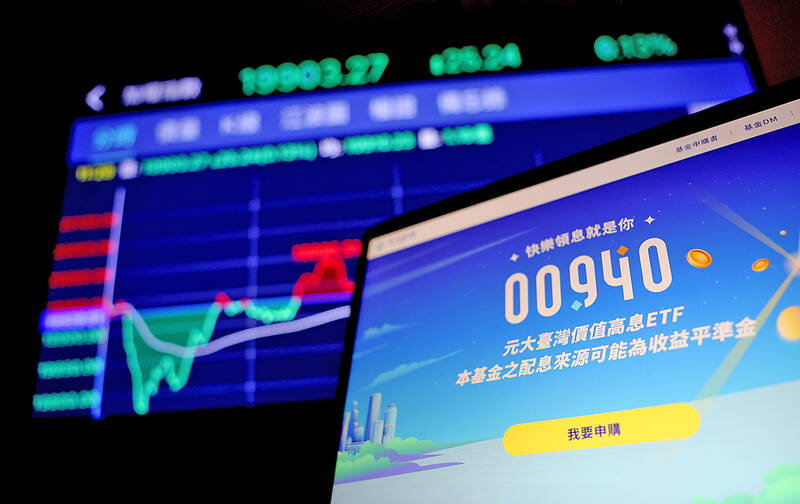Exchange-traded funds (ETFs) became major targets for investors in Taiwan last year, while ETFs with high dividend payouts were particularly popular, Taiwan Depository and Clearing Corp (TDCC, 台灣集中保管結算所) said on Wednesday.
The Cathay MSCI Taiwan ESG Sustainability High Dividend Yield ETF coded 00878 replaced China Steel Corp (中鋼), the nation’s biggest steelmaker, as the stock owned by the largest number of shareholders in Taiwan last year, TDCC said in a statement, citing a survey.
An ETF, a pooled investment security, which is traded like an individual stock, is able to track the price of a single stock or a large and diverse collection of securities.

Photo: CNA
After 00878, contract chipmaker Taiwan Semiconductor Manufacturing Co (TSMC, 台積電) came in second and was followed by China Steel, the Yuanta/P-shares Taiwan Dividend Plus ETF coded 0056, and the Capital TIP Customized Taiwan Select High Dividend ETF coded 00191.
China Steel in 2023 had the largest number of shareholders, ahead of TSMC, 00878, 0056 and KGI Financial Holding Co (凱基金控).
The top five stocks each had more than 1 million shareholders and the rankings showed investors favored ETFs over individual stocks, which has become an investment trend, TDCC said.
TSMC was one of the top five stocks owned by Gen Alpha, or those aged between 0 and 11; Gen Z, or those between the ages of 12 and 27; and Millennials, or those between 28 and 43 years old, it said.
The other four stocks were ETFs, with the top choice being 00878, it added.
Gen X, or those from ages 44 to 59; Baby Boomers, or those aged between 60 to 78; and investors older than 78 favored China Steel and their portfolios included fewer ETFs from the top five stocks, TDCC said.
The figures echoed a previous statement released by TDCC that said the number of shareholders of listed ETFs on the Taiwan Stock Exchange rose by almost 70 percent from a year earlier to more than 10 million last year.
Taiwan listed its the first ETF — 0050 — in 2003. More than two decades later, the country lifted a ban on trading active ETFs and multi-asset ETFs in August last year, as part of its efforts to transform itself into a wealth management hub in Asia.
A total of 181 ETFs are listed on the local market with NT$3.48 trillion (US$105.65 billion) in aggregate assets, TDCC said.
As of the end of last year, the local stock market had 12.98 million investors, up 700,000 from a year earlier, it added.

TAKING STOCK: A Taiwanese cookware firm in Vietnam urged customers to assess inventory or place orders early so shipments can reach the US while tariffs are paused Taiwanese businesses in Vietnam are exploring alternatives after the White House imposed a 46 percent import duty on Vietnamese goods, following US President Donald Trump’s announcement of “reciprocal” tariffs on the US’ trading partners. Lo Shih-liang (羅世良), chairman of Brico Industry Co (裕茂工業), a Taiwanese company that manufactures cast iron cookware and stove components in Vietnam, said that more than 40 percent of his business was tied to the US market, describing the constant US policy shifts as an emotional roller coaster. “I work during the day and stay up all night watching the news. I’ve been following US news until 3am

UNCERTAINTY: Innolux activated a stringent supply chain management mechanism, as it did during the COVID-19 pandemic, to ensure optimal inventory levels for customers Flat-panel display makers AUO Corp (友達) and Innolux Corp (群創) yesterday said that about 12 to 20 percent of their display business is at risk of potential US tariffs and that they would relocate production or shipment destinations to mitigate the levies’ effects. US tariffs would have a direct impact of US$200 million on AUO’s revenue, company chairman Paul Peng (彭雙浪) told reporters on the sidelines of the Touch Taiwan trade show in Taipei yesterday. That would make up about 12 percent of the company’s overall revenue. To cope with the tariff uncertainty, AUO plans to allocate its production to manufacturing facilities in

Six years ago, LVMH’s billionaire CEO Bernard Arnault and US President Donald Trump cut the blue ribbon on a factory in rural Texas that would make designer handbags for Louis Vuitton, one of the world’s best-known luxury brands. However, since the high-profile opening, the factory has faced a host of problems limiting production, 11 former Louis Vuitton employees said. The site has consistently ranked among the worst-performing for Louis Vuitton globally, “significantly” underperforming other facilities, said three former Louis Vuitton workers and a senior industry source, who cited internal rankings shared with staff. The plant’s problems — which have not

TARIFF CONCERNS: The chipmaker cited global uncertainty from US tariffs and a weakening economic outlook, but said its Singapore expansion remains on track Vanguard International Semiconductor Corp (世界先進), a foundry service provider specializing in producing power management and display driver chips, yesterday withdrew its full-year revenue projection of moderate growth for this year, as escalating US tariff tensions raised uncertainty and concern about a potential economic recession. The Hsinchu-based chipmaker in February said revenues this year would grow mildly from last year based on improving supply chain inventory levels and market demand. At the time, it also anticipated gradual quarter revenue growth. However, the US’ sweeping tariff policy has upended the industry’s supply chains and weakened economic prospects for the world economy, it said. “Now